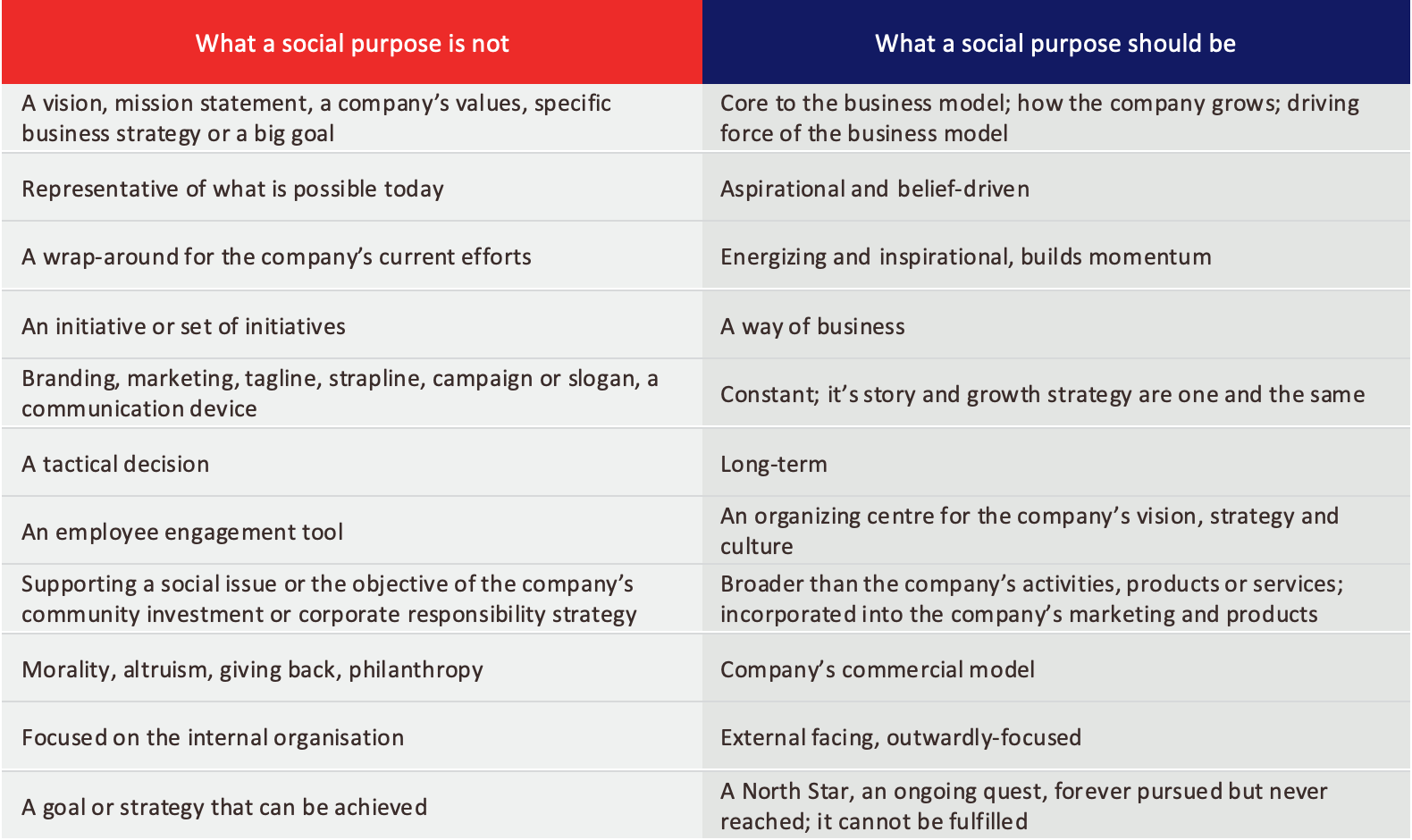In this blog, Richard Coates, Whitecap’s Managing Director, explores some of the key themes associated with Social Purpose: why it’s different from Corporate Social Responsibility (CSR); the link with profit objectives; and whether Social Purpose could be genuinely and more enthusiastically embraced within a number of market sectors.

There is a growing recognition that the coronavirus pandemic has accelerated developments and adoption of certain activity by approximately 5 years, especially within certain market sectors, for example: the shift to contactless payments, digital transformation in systems and processes, redefining customer experience and increased online engagement by consumers.
Clearly, these developments pre-dated Covid, but the changes we have all experienced in recent months have amplified and accelerated these initiatives and trends. Arguably, there has also been a shift in relation to placing greater value on relationships and supporting communities and citizens, especially in relation to the vulnerable in society. There appears to be a greater degree of awareness, care and sensitivity present today.
The concept of Social Purpose also pre-dates Covid; but will the understanding of it and its adoption by commercially focused organisations also be accelerated as a result of the pandemic?
What is Social Purpose?
According to the Vancouver-based Social Purpose Institute, a Social Purpose business is a company whose enduring reason for being is to create a better world. It is an engine for good, creating social benefits by the very act of conducting business. Its growth is a positive force in society.
Further, the Institute states that such businesses are adopting a ‘social purpose’ to navigate turbulent times and attract, engage and retain top talent and customers. They suggest it is possible to identify three core elements of a Social Purpose business: a reason for being, a social ambition, and a profit motive.
Reason for being: a social purpose company has an enduring reason for being which goes beyond the products / services it offers, and the reason for being guides decision making and strategies.
Social ambition: a social purpose company is one which has a social ambition; an aim to actively improve society and contribute to a greater good. It has a mission that everything it does increases a social good.
Profit motive: a social purpose company either sees its purpose as being beyond (or transcending) profitability, or alternatively, as a route to profitability, where profit is a result of social purpose.
Given this definition, there is no conflict between an organisation focused on Social Purpose and a profit objective; in fact, a profit aim (and performance) is critical to be able to deliver the desired social benefit.
Of course, there are numerous examples of organisations focusing on and delivering Social Purpose in the charities sector, for example. However, this is a philosophy which is being explored and embraced, at least in part, to varying degrees by commercially orientated organisations too.
In the September-October 2017 issue of the Harvard Business Review, an article was published – ‘Competing on Social Purpose’ – within which the authors (Omar Rodriguez Vila and Sundar Bharadwaj) noted several global brands increasingly using Social Purpose as part of their marketing and brand engagement. Whilst many of the examples highlighted in the article represented marketing campaign activity, rather than core business purpose and mission, there was still a strong focus on delivering a social benefit from the activity of the organisation.
Is Social Purpose Different to CSR?
Corporate Social Responsibility has become an established component for most organisations.
In 2014, UK Government defined corporate social responsibility as “the responsibility of an organisation for the impacts of its decisions on society and the environment above and beyond its legal obligations, through transparent and ethical behaviour”.
CSR has evolved over recent years from an awareness of that organisational activities impact on communities, society and the environment, to actively seeking alignment between the business strategy and these external factors. More recently, this has evolved further by some organisations aiming to leverage their value chain, social networks and/or ecosystems in some cases.
The Social Purpose Institute recognises the value of CSR but believes that it is different to Social Purpose. Perhaps this is best illustrated in their table below:

Arguably, Social Purpose is a deeper and more fundamental philosophy, approach and practice for organisations; getting to the core of why they exist, what they do and their strategic aims.
Perhaps one simple interpretation of the difference between Social Purpose and CSR is that CSR can be a series of tactical and strategic initiatives supporting the business aims and strategies. Social Purpose ‘is’ the business aim and strategy.
Why is This Important?
We believe that Social Purpose, is one of the societal and strategic trends to have the potential to develop and strengthen over the coming years and it should be on the watch-list for many organisations.
It will be interesting to see the extent to which there is a material attitudinal change in consumer behaviour that will endure following the pandemic and be sustained for the long-term.
However, this is not just an issue for the future. Today, there are several types of organisation that have the potential to legitimately embrace Social Purpose aims and develop these comfortably aligned to their commercial and profit objectives.
For example, mutually owned organisations, such as building societies and financial mutuals are focused on serving their members as a result of their ownership structure. Most mutual organisations have their roots and heritage based on a region or location. Depending on the strategic aims of the organisations, community engagement is orientated towards employment, a local presence and CSR. However, for many, Social Purpose is truly at the core of their strategic vision and purpose, although it is often wrapped-up in the concept of mutuality
Mutuality is reflected in the governance, business strategies, operational decisions and the culture of these organisations, creating the potential for a genuine customer orientated approach. And whilst mutuality itself is not well understood by customers, the outcomes of it are and these are well aligned to the ideals of Social Purpose.
In higher education, there is a trend, especially for the place-based universities, to seek and develop stronger links with the host community. The concept of the Civic University, and anchor institutions, is promoted by the Universities Partnership Programme, who state “Universities play a key role nationally through their teaching and research work. But they are also hugely important to the economic, social, cultural and environmental wellbeing of the places in which they are located”.
These aims strongly align to Social Purpose within a regional context; not to mention the education and skill development objectives of universities which can also be attributed to Social Purpose.
As a final example, privately operated care organisations are delivering a valuable service to the vulnerable in our society, taking pride and satisfaction in the work they do and how they do it. Therefore, Social Purpose is evident today and could be further embraced amplified within this sector.
In summary, we have all had moments over the last year where we have reflected on the balance between business and personal priorities and wondered what will endure and change as we return to a new ‘normal’, and what will revert to how things were before for customers, employees and investors.
There are several underlying trends and perspectives, as outlined in this paper, and many more such as conscious consumerism, which may grow and become more significant following our collective recent pandemic experience, and as society impact and sustainability strengthen as agenda topics.
We would argue strategy works best when organisations have a very clear view of their purpose, and when this is clearly and explicitly linked through to their market positioning, strategic objectives, key initiatives and investment plans. The emergence of Social Purpose as a talked-about trend is a reminder to all organisations of the importance of this internal ‘coherence’ and possibly an opportunity for some to re-examine whether their current purpose is sufficiently compelling.
If you’d like to discuss this blog post or share your own perspective on the issues covered, please get in touch or comment via our social media channels on LinkedIn or Twitter.
Established in 2012, Whitecap Consulting is a regional strategy consultancy headquartered in Leeds, with offices in Manchester, Milton Keynes, Birmingham, Bristol and Newcastle. We typically work with boards, executives and investors of predominantly mid-sized organisations with a turnover of c£10m-£300m, helping clients analyse, develop and implement growth strategies. Also, we work with clients across a range of sectors including Financial Services, Technology, FinTech, Outsourcing, Consumer and Retail, Property, Healthcare, Higher Education, Manufacturing and Professional Services, including Corporate Finance and PE.